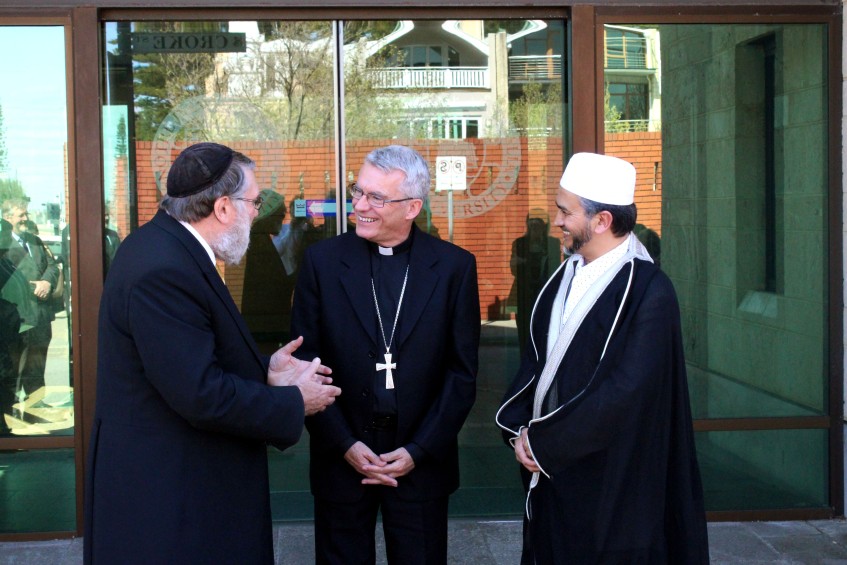Abraham Day brings three faiths together in the spirit of welcoming

Rabbi Dovid Freilich, Archbishop Timothy Costelloe SDB and Imam Sheikh Muhammad Agherdien joined together to celebrate the message of their respective faiths for Abraham Day, celebrated at the University of Notre Dame Australia on 14 September. Photo: Supplied.
By Caroline Smith
In addition to being the ‘father’ of three monotheistic faiths – Judaism, Christianity and Islam – Abraham is also a model of the welcoming behaviour that we should show to others, including strangers and outsiders.
This message was the focal point of Abraham Day, celebrated last week at the University of Notre Dame Australia (UNDA), with keynote speakers from each of the three communities: Archbishop Timothy Costelloe SDB, Rabbi Dovid Freilich from Perth Hebrew Congregation, and Sheikh Muhammad Agherdien, Teacher at Langford Islamic College.
The event, held on Thursday 14 September, carried the theme ‘Abraham: Welcoming and Standing Up for the Other’, and was the second Abraham Day hosted at UNDA, following its launch last year.
Addressing attendees in the Drill Hall in Fremantle, Archbishop Costelloe said people of faith should challenge themselves to welcome others in a genuine and caring fashion.
“A real welcome, a sincere welcome, comes from the heart, we might say it is all about one heart meeting another,” he said.
“It is about a real human connection being established between two or more people, and it becomes the basis for a real, respectful, life-giving encounter which leaves all those involved acknowledged, affirmed, and uplifted.
“We might reflect this afternoon on whether or not our hearts are really in this project of welcoming, if they are those compassionate hearts that our three religions, which all look to Abraham as our common father and ancestor in our faith, seek to form within us.”
He added that people should call on the traits of courage, compassion and conviction to stand up for others, following the guidance of Abraham and the Good Samaritan.
“This Samaritan answers our question for us: who is the ‘other’? The ‘other’ is anyone who is in need of help, anyone who is downtrodden, anyone who is rejected or ill-used, and I want to suggest this afternoon that our three religious traditions, Judaism, Christianity and Islam, have a vital role to play, and precious resources to bring to bear, in helping our society to become worthy of the gift of human life we have received from our creator, the one all-merciful God from whom we all come and to whom we will all return,” the Archbishop said.
Rabbi Dovid Freilich, reflecting on the event, said Abraham stood out as a biblical figure because of his emphasis on justice and caring for others, including those who had been condemned or rejected.
“One example is how he argues with God to save the people of Sodom. He argues with God, and God encourages the argument, to show the descendants of Abraham that we must care for all people, and try and save them,” he said.
“Abraham is also important in how he shows hospitality. There’s a story in Genesis about how he’s sitting in his tent, and God appears to him. But Abraham sees three men, and immediately rushes off to welcome them.
“God is not at all concerned, instead He rewards Abraham for this, showing that God asks us to show hospitality to all His children.”
Rabbi Freilich also emphasised the ordinariness of Abraham, saying that his ability to rise to God’s call was a lesson people of faith could be guided by.
“I think it’s significant that while there’s lots of discussion about why Moses was chosen to lead the Jewish people, what qualities he had, there’s no discussion about why Abraham was chosen to be the father of the Jewish people,” he said.
“It seems to show that any person has within themselves the ability to respond to God’s call, to raise ourselves up and meet those requirements. And this is significant, because as the great, great, great, great grandchildren of Abraham, we have it in our spiritual DNA to behave as he did.”
Sheikh Muhammad Agherdien said one of Abraham’s key roles in Islam and as father to people of faith was his ability to model a righteous community.
“Abraham symbolises what a nation should be like, how they should live, how they should conduct themselves, and how they should function in a good, well-established model society,” he said.
Another lesson of importance was the ‘Golden Rule’ which emphasised the need to treat others equally and with compassion, he added.
“Compassion has often been misunderstood and thought to mean to feel sorry for the other, to pity somebody else.
“But in effect in means to experience with somebody else what they experience, to really feel their emotional state: the trials and tribulations, the sorrows, what they are going through. So it is important that we stand up for each other in the spirit of Abraham in that particular manner,” Sheikh Muhammad said.
Sheikh Muhammad also honoured religious leaders for their compassion towards the Rohingya people who are currently experiencing ethnic cleansing in Myanmar.
